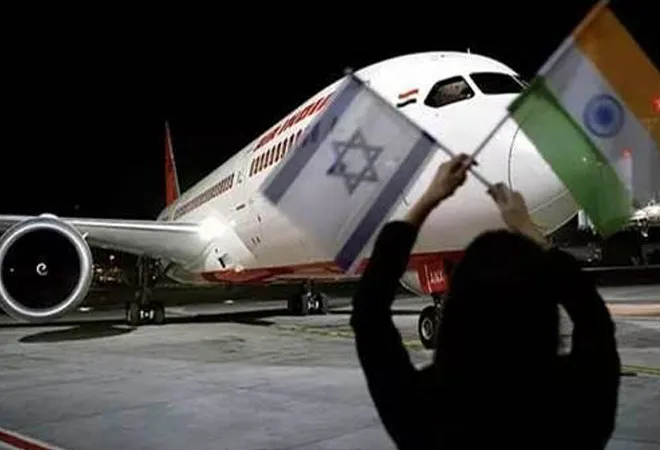-
CENTRES
Progammes & Centres
Location

Never before 2019, have the elections in Israel and India been so closely connected. Due to an anticipated call for elections following a dispute within the government coalition and the corruption charges against Prime Minister Binyamin Netanyahu, the electoral seasons in both India and Israel coincided for most of the spring. Voters were first called to the polling booths to elect their respective parliaments in April 2019, albeit the outcome of the seven-phase voting process was only revealed in India five weeks later, on May 23. This parallel calendar, and the fact that its two leaders running for re-election, Prime Minister Narendra Modi and Prime Minister Binyamin Netanyahu, carefully publicised their close friendship and working relationship over the last five years, meant that the electoral campaigns and outcomes were more closely scrutinised than usual in both countries. In addition, Prime Minister Modi became an indirect actor in Netanyahu’s electoral strategy by appearing in campaign posters. Have India-Israel ties traditionally been an electoral and partisan issue in both countries? As Israeli voters are now heading back to the polls on 17 September 2019, after the failed efforts by incumbent Prime Minister Netanyahu to form a governing coalition, it is important to consider the implications of these elections for the future of India-Israel ties.
While the India-Israel relationship had already been steadily growing over the last two decades mostly as result of a robust defense partnership (India became the largest arms customer of Israel in 2017 with sales worth US$715 million and Israel has been India’s third largest weapons supplier, after Russia and the U.S., over the last decade). However, the technical cooperation between Israel and Indian states on agriculture, irrigation and water supply projects, the bonhomie between Modi and Netanyahu seems to have further publicised the bilateral ties.
Shortly after his first election in May 2014, Modi was congratulated by Netanyahu, who saw a potential to build on personal sociability to further cement and diversify ties with India under a new BJP government. This call was quickly and enthusiastically reciprocated by Modi through public statements and then in diplomatic practice. Both leaders have then regularly met in various international forums such as the UNGA, COP24 and so on. While previous governments had interacted equally amiably with Israeli officials and had established the foundations for the burgeoning defense relationship, Modi’s regular meetings with Netanyahu marked a strong departure from an apparent informal norm of not publicly broadcasting the growing bilateral ties between the two countries. There was still a strong perception that any meeting would signal a decisive realignment in India’s West Asia policy. For instance, the previous Prime Minister, Manmohan Singh, never openly met with his Israeli counterpart during his ten year tenure.
While previous governments had interacted equally amiably with Israeli officials and had established the foundations for the burgeoning defense relationship, Modi’s regular meetings with Netanyahu marked a strong departure from an apparent informal norm of not publicly broadcasting the growing bilateral ties between the two countries.
In July 2017, an additional historical milestone in the relationship was achieved and most likely facilitated by the strong personal bonds between the two leaders: Modi became the first-ever sitting Indian head of government to visit Israel on occasion of the 25th anniversary of the establishment of diplomatic relations between the two countries. On this milestone, the two states further acknowledged their rapprochement by elevating their ties to a strategic partnership. The courtesy of the first ever Indian Prime Ministerial visit to Israel was then returned by Netanyahu who also travelled to New Delhi in January 2018. However, despite this visit, the first one by a sitting Israeli Prime Minister since Ariel Sharon in 2003, Netanyahu has not returned to India since, despite his expressed intention to do so twice in 2019.
Given this bonhomie between the two leaders and the rhetoric about elevating the growing partnership to new heights, how can we interpret the cancellation of two planned Netanyahu visits in March 2019, and then again, in September 2019? On both occasions, the visits would have taken place only two weeks before Israeli elections, most likely under close electoral scrutiny. While we would need to know more about the exact details of these cancelled visits, the electoral and political dimensions of these visits are not trivial. Facing a complicated re-election bid and anticipating difficult coalition-building efforts in the coming weeks, a constraint he publicly complained about to Modi, Netanyahu has attempted to boost his foreign policy credentials through a two-pronged strategy. First, Netanyahu’s electoral campaign has put up banners titled “Netanyahu: In a league of his own” featuring pictures of the Israeli Prime Minister shaking hands with foreign leaders like Modi, Russia’s Vladimir Putin and America’s Donald Trump. Second, Netanyahu also planned a series of trips to Japan, Russia, the UK, and to India, to further showcase his close international friendships. However, due to this hastened schedule, the Israeli Prime Minister chose to cancel the visits to Tokyo and New Delhi. Netanyahu contacted Modi to quickly clarify that the repeated cancellations should not be interpreted as a diplomatic slight. This begs the question of why the current Israeli leadership would instrumentalize (and potentially compromise) close partnerships for short-term domestic electoral objectives.
Facing a complicated re-election bid and anticipating difficult coalition-building efforts in the coming weeks, a constraint he publicly complained about to Modi, Netanyahu has attempted to boost his foreign policy credentials through a two-pronged strategy.
Remarkably, while the introduction of the issue of India-Israel ties into electoral debates and campaigning in Israel seems to be a relatively new phenomenon, there is a longer history of it being a highly polarised topic in Indian politics. For decades, the Indian National Congress (INC) debated with various political parties of the opposition such as the Bharatiya Jana Sangh, the Swatantra Party, and Praja Socialist Party, over the opportunity to establish diplomatic ties with Israel. This highly politicised debate long-impeded any pragmatic reassessment of the merits and limits of developing ties the Jewish state. In contrast, since the normalisation of diplomatic relations in 1992, there has been a bipartisan political consensus between Congress and the BJP, but also among regional parties, in support of cooperation with Israel in certain fields such as defense, trade and agriculture.
While it is evident that regular visits and personal chemistry between Modi and Netanyahu have served as a strong foundation to sustain and potentially strengthen bilateral ties, there are also risks linked to the framing of this partnership as solely one between personalities and political parties. One should remember that it was the Congress-ruled governments which initially recognized Israel in 1950 and established diplomatic relations in 1992, and that a previous BJP government developed stronger defense ties with a labour government under Prime Minister Ehud Barak in Israel from 1999 to 2001. The India-Israel relationship has historically been supported by multiple stakeholders and is therefore not conditioned by the electoral fates of both Modi and Netanyahu and their respective parties.
The views expressed above belong to the author(s). ORF research and analyses now available on Telegram! Click here to access our curated content — blogs, longforms and interviews.

Nicolas Blarel is Assistant Professor of International Relations at the Institute of Political Science Leiden University in The Netherlands. He has published The Evolution of ...
Read More +